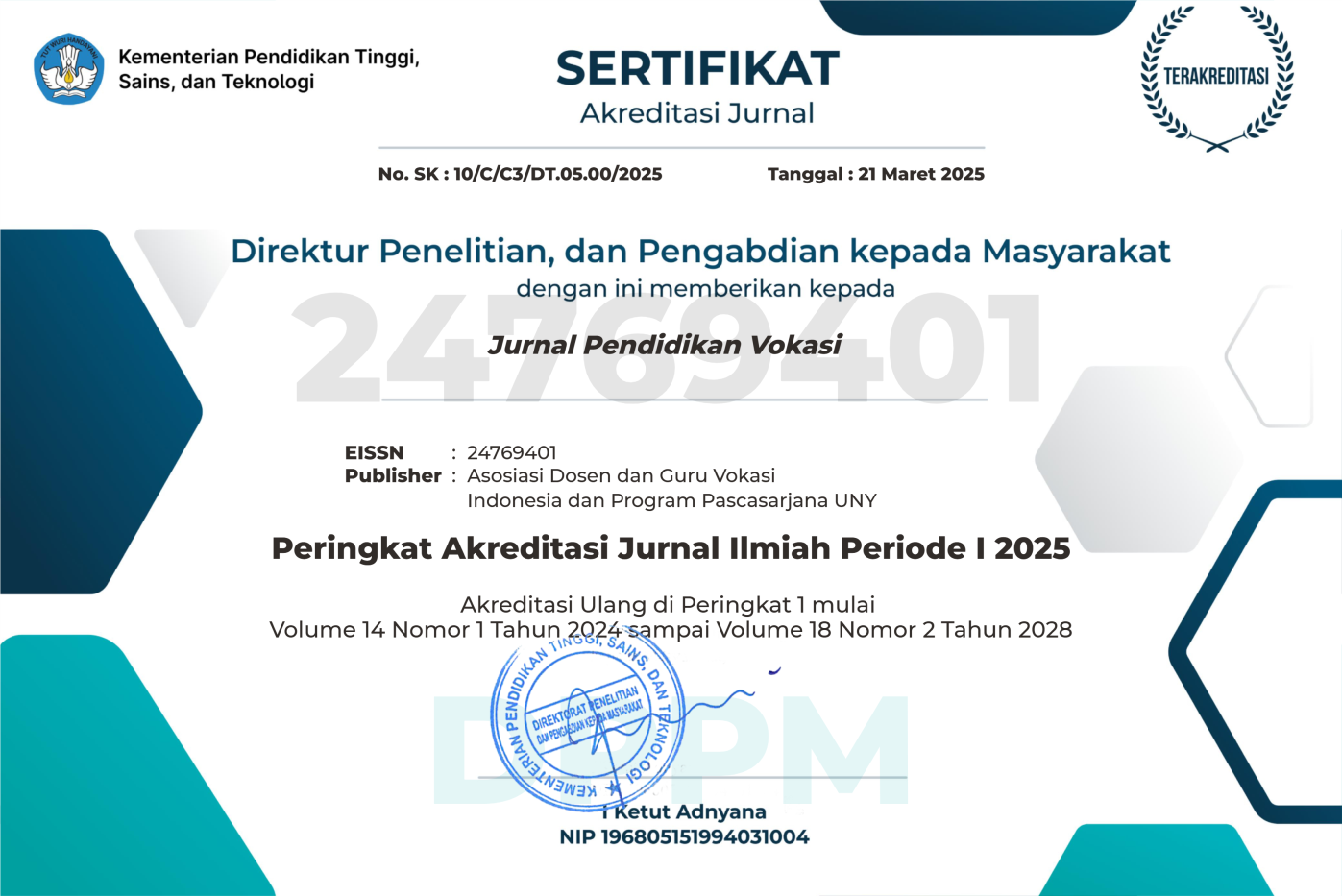The effectiveness of the use of metacognition-based industrial electronic learning tools in growing higher order thinking skills (HOTS)
DOI:
https://doi.org/10.21831/jpv.v7i2.13447Keywords:
the effectiveness, learning tools, metacognition, industrial electronics, higher order thinking skillsAbstract
References
Amalathas, E. (2010). Learning to learn in further education. A literature review of effective practice in England and abroad. Retrieved from www.cfbt.com
Chang, S.-H., Ku, A.-C., & Yu, L.-C. (2011). Analysing practical skills of vocational school students in metacognition - a case study of an electronic practical course in Taiwan. In 2nd WIETE Annual Conference on Engineering and Technology Education (pp. 53–57). Pattaya: World Institute for Engineering and Technology Education (WIETE). Retrieved from http://www.wiete.com.au/conferences/2wiete/Pages/12-16-Ku.pdf
Dharma, S., Sugiyono, Mulyatinigsih, E., Sutopo, Irwanto, Palusu, J. E., ... Siswanto, R. (2013). Tantangan Guru SMK Abad 21. Jakarta: Direktorat Pembinaan Pendidikan dan Tenaga Kependidikan Menengah, Direktorat Jenderal Pendidikan Menengah, Kementerian Pendidikan Menengah.
Direktur Jenderal Pendidikan Menengah Kementerian Pendidikan dan Kebudayaan. Surat Keputusan tentang Spektrum Pendidikan SMK, Pub. L. No. 7013/D/KP/2013 (2013). Indonesia.
Faraday, S., Overton, C., & Cooper, S. (2011). Effective teaching and learning in vocational education. London: LSN. Retrieved from http://www.coopergibson.co.uk/110052RP_effective VET_final report.pdf
Flavell, J. H. (1979). Metacognition and cognitive monitoring: A new area of cognitive-developmental inquiry. American Psychologist, 34(10), 906–911. https://doi.org/10.1037/0003- 066X.34.10.906
Hopkins, D. (2007). Every school a great school : realizing the potential of system leadership. McGraw-Hill/Open University Press.
Jossberger, H., Brand-Gruwel, S., van de Wiel, M. W. J., & Boshuizen, H. P. A. (2015). Teachers' perceptions of teaching in workplace simulations in vocational education. Vocations and Learning, 8(3), 287–318. https://doi.org/10.1007/s12186-015-9137-0
Kerka, S. (1992). Higher order thinking skills in vocational education. Retrieved April 29, 2008, from https://www.ericdigests.org/1992- 1/order.htm
Kipnis, M., & Hofstein, A. (2008). The inquiry laboratory as a source for development of metacognitive skills. International Journal of Science and Mathematics Education, 6(3), 601–627. https://doi.org/10.1007/s10763-007- 9066-y
Kompas. (2016). Kompas Edisi Senin 2 Mei 2016. Retrieved from https://kompashariini.blogspot.co.id/201 6/05/kompas-edisi-senin-2-mei-2016.html
Ku, K. Y. L., & Ho, I. T. (2010). Metacognitive strategies that enhance critical thinking. Metacognition and Learning, 5(3), 251–267. https://doi.org/10.1007/s11409-010- 9060-6
Kung, R., Danielsson, A., & Linder, C. (2005). Metacognition in the student laboratory: Is increased metacognition necessarily better? Retrieved March 10, 2010, from http://journals.ohiolink.edu.proxy.lib.ohio-state.edu/ejc/pdf
Lai, E. R. (2011). Metacognition: A literature review. Retrieved from http://images.pearsonassessments.com/i mages/tmrs/metacognition_literature_rev iew_final.pdf
Lee, M., & Baylor, A. L. (2006). Designing metacognitive maps for web-based learning. Journal of Educational Technology & Society, 9(1), 344–348. Retrieved from http://www.ifets.info/journals/9_1/28.pdf
Livingston, J. A. (1997). Metacognition: An overview. Retrieved December 23, 2008, from http://gse.buffalo.edu/fas/shuell/cep564/metacog.htm
Lucas, B., Spencer, E., & Claxton, G. (2012). How to teach vocational education: A theory of vocational pedagogy. London: Centre for Real-World Learning at the University of Winchester. Retrieved from http://www.winchester.ac.uk/aboutus/lifelonglearning/CentreforRealWorldLearning/Documents/How-to-teach- vocational-education Bill Lucas Ellen Spencer and Guy Claxton.pdf
Munby, H., Hutchinson, N. L., & Chin, P. (2009). Workplace learning: metacognitive strategies for learning in the knowledge economy. In R. Maclean & D. Wilson (Eds.), International Handbook of Education for the Changing World of Work (pp. 1763– 1775). Dordrecht: Springer Netherlands. https://doi.org/10.1007/978-1-4020- 5281-1_119
Sudira, P. (2016). TVET abad 21 filosofi, teori, konsep, dan strategi pembelajaran vokasional. Yogyakarta: UNY Press.
Supardi. (2013). Sekolah efektif. Jakarta: PT. Raja Grafindo Persada.
Susanto, A. (2013). Teori belajar & pembelajaran di sekolah dasar. Jakarta: Kencana Prenada Media Group.
Trisdiono, H. (2013). Strategi pembelajaran abad 21. Retrieved from http://lpmpjogja.org/strategi- pembelajaran-abad-21/
Wijaya, E. Y., Sudjimat, D. A., & Nyoto, A. (2016). Transformasi pendidikan abad 21 sebagai Tuntutan pengembangan sumber daya manusia di era global. In Prosiding Seminar Nasional Pendidikan Matematika 2016. Universitas Kanjuruhan Malang.
Downloads
Published
How to Cite
Issue
Section
Citation Check
License
The authors submitting a manuscript to this journal agree that, if accepted for publication, copyright publishing of the submission shall be assigned to Jurnal Pendidikan Vokasi. However, even though the journal asks for a copyright transfer, the authors retain (or are granted back) significant scholarly rights.
The copyright transfer agreement form can be downloaded here: [JPV Copyright Transfer Agreement Form]
The copyright form should be signed originally and sent to the Editorial Office through email to jpvokasi@uny.ac.id
Jurnal Pendidikan Vokasi by http://journal.uny.ac.id/index.php/jpv is licensed under a Creative Commons Attribution-ShareAlike 4.0 International License.












